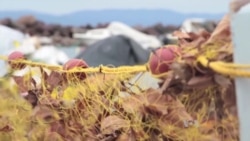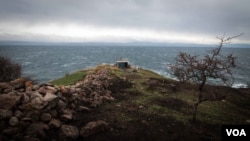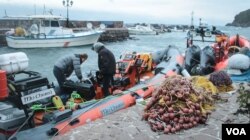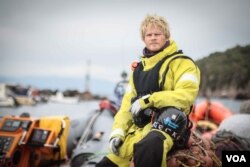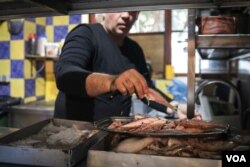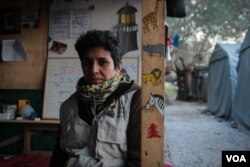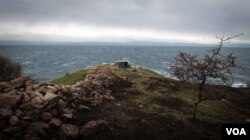Looking out across the narrow slither of the Aegean Sea that separates the small Greek village of Skala Sikamineas from the Turkish mainland, all appears calm.
Previously crowded with the dinghies of refugees and the speedboats of their smugglers, the number of those braving the crossing has eased from a torrent to a trickle during 2016.
The tranquility is uncertain, however, in the wake of Turkish President Recep Tayyip Erdogan’s threat to allow refugees to make the crossing. Dinghies are reportedly being amassed along parts of the Turkish coast.
Yet in this small fishing community perched on the north coast of Lesvos, one of the first that would feel the impact of any new surge, the compassion for those arriving on their shores remains undimmed.
Only thing to do
At its peak last year, the stream of refugees reached 88 boats in one day, Stratos Valiamos recalled, each making the 5 mile journey from Turkey, and each packed with dozens of people.
Often forgoing the catches they needed to feed their families, fishermen here spent their working hours assisting in efforts to rescue those who put their faith in the smugglers, only to be packed into overcrowded, unreliable dinghies.
“They were asking for help,” Valiamos said, “some boats had holes, in others the engines didn’t work. We were finding people who were swimming in order to reach us.”
Meanwhile on the shore, villagers took in families, shaken from their crossing and uncertain of what was to come next.
“The only thing you do is help,” added Valiamos, who was nominated for a Nobel Prize and whose attitude is typical of many in Skala Sikamineas.
“And if it happens again, we will do the same,” he said.
Refugee deal on shaky ground
Valiamos and many others in his community now have time to return to their lives — according to the UN’s refugees agency, last month an average of 66 people arrived daily across the whole of Lesvos, compared with 12,500 daily in August 2015.
But that may change in the wake of the growing political gulf between the European Union (EU) and Turkey.
Made in March, the EU-Turkey agreement included a plan to send “new irregular migrants” who had just arrived in Greece back to Turkey and prompted a crackdown by Turkish authorities on those attempting the journey.
But the agreement is now on shaky ground as the two sides clash over Ankara’s potential EU membership.
With Europe critical of the political clampdown in Turkey following a July coup attempt, Erdogan recently threatened that “the border gates will be opened.” His country is home to more than 2.7 million refugees.
It is threat being taken very seriously by Richard Heard, who is part of Refugee Rescue, a volunteer lifeboat rescue crew stationed in Skala Sikamineas, which is now on high alert.
“I feel if he want to stop the smuggling trade, he can; and I feel if he wants to open it up and send thousands, well that’s well within his power,” Heard said.
Tourism suffered
Villagers who have helped refugees for much longer than a decade are now waiting to see how the current political struggle will play out, aware that they will feel the impact.
In the wake of last year’s refugee crisis, Lesvos’ crucial tourism industry has been badly hit, and Skala Sikamineas is no exception.
In the past, Georgios Gigintis has been hassled by the police for driving refugees to the nearest town, but as a hotel owner, he is worried about large numbers of new arrivals.
He says that even though the number of refugees was far lower than before, bookings over this summer were down 90 to 95 percent.
“I don’t know what could happen tomorrow — we’re between our government and the Turkish government,” he said.
Same theater
Yet while some nearby towns have started shunning refugees and the volunteers that help them — there have been several small protests when refugees are brought on shore — those in Skala Sikamineas refuse to tread this path.
“Before there were no volunteers, there were no rescue teams, there were just fishermen and local people helping in the shore, on the sea, and dealing with situation alone, and they will continue to,” said Andrea Montenegro of Lighthouse Relief, another organization based in the village.
“We’re here because they want us to be,” she said.
Despite his fears, Gigintis refuses to blame the refugees themselves.
“I think it is in our nature to help, because of our own history,” he said, referring to the mass movement of Pontian and Anatolian Greeks amid persecution in the early 20th century in what is modern-day Turkey — an event commemorated by the Greek government as genocide.
“We now have the same theater, but with different actors,” he said.
Pawns in a game
Hostility, it seems, is only reserved for the politicians themselves.
Numerous residents who spoke to VOA referred to what they called “the game,” and the sense that the political classes had no concern for either the refugees’ welfare or that of the town.
And whether the boats gathered on the shores across the water from their 145-person strong community launch, and fresh thousands arrive, it is a fate they seem resigned to.
Unable to change their situation, they have chosen to react to it with compassion.
“They are playing games with these people,” said Valiamos of situation faced by refugees, “and me as well, I am regarded as their pawn.”




